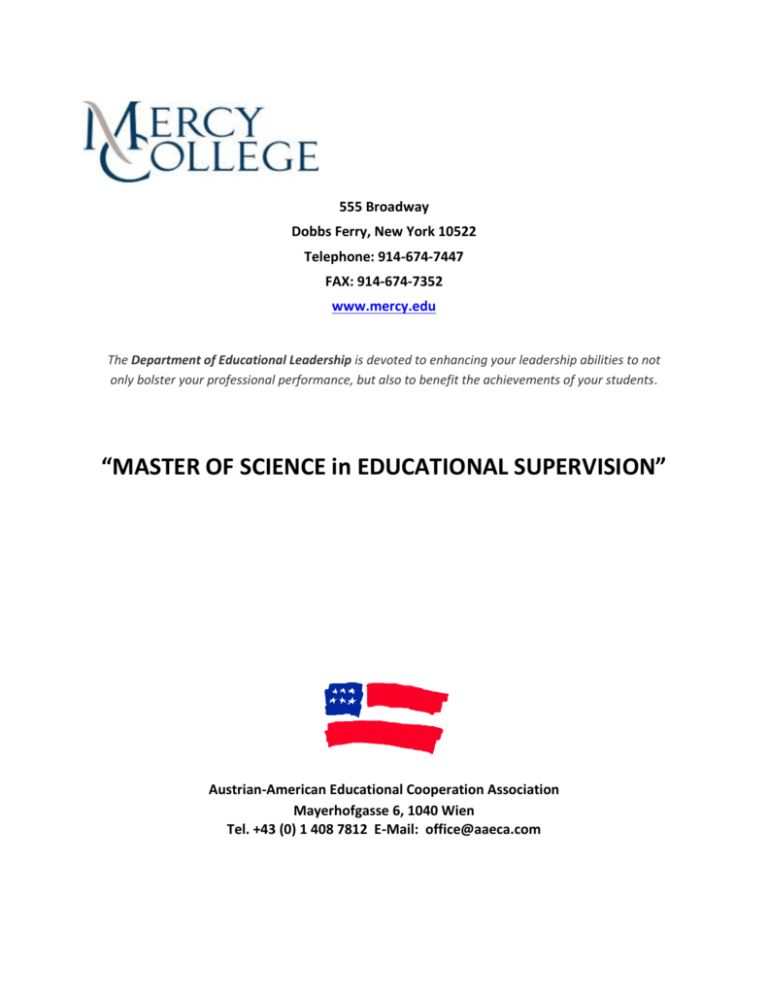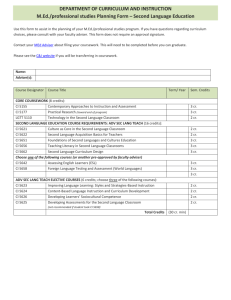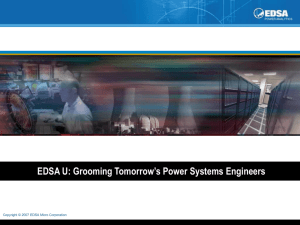MASTER OF SCIENCE in EDUCATIONAL Supervision
advertisement

555 Broadway Dobbs Ferry, New York 10522 Telephone: 914-674-7447 FAX: 914-674-7352 www.mercy.edu The Department of Educational Leadership is devoted to enhancing your leadership abilities to not only bolster your professional performance, but also to benefit the achievements of your students. “MASTER OF SCIENCE in EDUCATIONAL SUPERVISION” Austrian-American Educational Cooperation Association Mayerhofgasse 6, 1040 Wien Tel. +43 (0) 1 408 7812 E-Mail: office@aaeca.com Mission The Program will prepare individuals who supervise and/or aspire to administer schools in the 21st century with diverse populations and changed expectations for school leaders. Upon program completion, candidates will possess the dispositions, skills, and leadership characteristics to be successful in today’s international educational environment. They will be able to lead teachers and staff successfully in the implementation of curricula that address the diverse academic needs and cultures of students in Austrian schools. Program of Study The MS Educational Supervision program is 30 credits. Each course carries 3 credits; courses will be offered in one of two modalities: (1) online and (2) blended sessions during a summer internship. The expected outcomes of the program are to conduct successful schools that address the needs of their diverse student populations; provide professional development for staff; differentiate instruction; incorporate sound management practices in school operations; provide strategies and information concerning successful programs to effectively engage families and community in schools; and employ technology for purposes of administration, supervision, and instruction. The program utilizes a cohort model for instruction since research has demonstrated that this is most conducive for inspiring individual and organizational development. Projects and action research will ask program participants to demonstrate they understand and apply the knowledge, skills, and concepts in education and management that they learned through coursework, discussions in classes, and “networking” with peers and incumbent school leaders in the United States (particularly in New York) and Austria. The projects and action research will involve schools and/or school settings. Scheduling Courses will be conducted during two semesters each year and in the summer. Candidates must commit to participating in all required classes scheduled for these sessions. As noted above, modes of instruction will include online courses and one blended internship course during the summer. 2 The proposed courses, descriptions, and a schedule are outlined below. In the appendix a full schedule with specific dates courses are to be offered and copies of course syllabi. Semester Spring 2016 Course I Course II Theories into Practice Managing the Teaching Learning Process EDSA 520 EDSA 540 Total Semester Credits 6 credits Jan 20 –May 10 Summer 2016 May 27 – June 30 Introduction to Action Research 3 credits EDSA 510 Summer 2016 July/ Aug 1 Internship (Blended course – involves shadowing a school leader, spending time visiting schools, and attending seminars ) Visit to NY: Practicum with experienced school leaders: School visits Roundtable discussions Accountability for school leaders 3 credits Clinic for School Administrators 6 credits EDSA 590 July 11 - 22 Fall 2016 Cultural Pluralism Sep 7 – Dec 23 EDSA 525 EDSA 580 Spring 2017 Organizational Dynamics and the Culture of School System Human Resources Management for School Administrators EDSA 552 6 credits Organization of the Community Relations Program Critical Issues in Special Education 6 credits EDSA 535 EDSA 545 Jan 18 –May 9 EDSA 555 Summer 2017 May 31 -Aug 8 3 Course Descriptions EDSA 510 Introduction to Action Research This class will study the essential concepts, principles, and methods employed in the field of education research. Focus will be on formulation and development of improvement of one problem affecting student achievement for investigation in the student's workplace; survey of the related literature; selection and use of one or more appropriate methods for gathering evidence coupled with statistical analysis for experimental and control groups; interpretation of data; and reporting and implications of findings. 3 credits EDSA 520 Curriculum and Teaching: Theories into Practice This course stresses the developmental mental processes, the principles of curriculum development, the role of school personnel, curriculum goals and objectives, the characteristics of excellent teachers, the problems that new teachers face, the mentoring process, what administrators can do to keep good teachers, what students must learn, differentiated instruction, multicultural education, and data driven decision making. The learning activities for this course are designed to prepare each student with essential knowledge and competencies for effective instructional leadership and curriculum development and the supervision of teachers in implementing effective pedagogical strategies in this millennium. 3 credits EDSA 525 Cultural Pluralism This course focuses on the significance of ethnicity and cultural diversity in the classroom and school system and its implications for the school administrator. The course traces the movement from total assimilation and the “melting pot” theory to a cultural pluralism which encourages each group to value its own contribution but at the same time gives support to the overall needs of the community and the nation. A major goal is to explore the manner in which the school can play a role in promoting the principles of unity through diversity and how the school administrator can take a leadership role in fostering this goal. Fifteen hours of fieldwork required. 3 credits. EDSA 535 Organization of the Community Relations Program This course studies the nature of interest groups in urban and outer districts seeking to influence schools. It focuses on the role of school administrators in developing school-community programs and the involvement of school and community personnel in a program to further the educational aims of the community. Achievement is evaluated on the basis of the quality and the content of written papers, oral reports, class discussion and a final examination. 3 credits EDSA 540 Managing the Teaching Learning Process This course examines procedures, processes, and practices specifically related to the administration of the teaching-learning process, an understanding of professional development and staff motivation as a contributing factor to the success of the teaching-learning process, 4 developing insight and skills as to integrate technology into all curriculum areas. The process of observing and assessing instruction in classroom settings is studied in detail. Fifteen hours of fieldwork required. 3 credits. EDSA 545 – Critical Issues in Special Education This course is designed to engage candidates for school building leadership in an examination of critical issues and trends related to the provision of PK–12 special education programs and services. Content has been selected to provide school leadership candidates with the knowledge, skills, and special education systems understanding necessary for leadership and management of schools as complex organizations in which all students are expected to achieve. 3 credits. EDSA 552 Human Resources Management for School Administrators The scope of the course will consist of critical issues in human resource administration in the 21st century. It is expected that the course will provide insight and assistance in the development of caring, critical and reflective professionals responsive to the needs of a diverse society. 3 credits EDSA 555 Organizational Dynamics and the Culture of School Systems This course will explore the different theories that guide educational leadership practices in school systems. The focus of this course explains organizational administrative behavior in school systems, with special emphasis on structure, politics, decision making, and quality outcomes. The class will include discussion and analysis of cases, examination of experiences in schools and districts, and the application of theory to practice. 3 credits EDSA 580 Clinic for School Administrators The clinic provides a college setting in which present and prospective administrators can consider current issues, problems, and opportunities in contemporary school systems. Areas of review will include productivity and accountability, economic and demographic trends, governance, and the changing family structure. Achievement is determined on the basis of case study problem solving, the development of a case study based on individual experience, written and oral reports, class participation and a final examination. 3 credits EDSA 590 Internship A cooperatively guided administrative experience focuses on decision-making, the internship experience offers candidates practical experiences to the ongoing responsibilities of a practicing administrator. The internship provides an opportunity for candidates to discover their own strengths, talents, leadership styles, needs and interests. This training enables candidates (under the auspices of an experienced supervisor and college professor) to apply administrative skills to pragmatic school situations. Program participants are required to develop an electronic portfolio to document the learning experiences and accomplishments of their internships. 5 Review of Participants’ Progress and Achievement Candidates will receive ongoing support and mentoring throughout the program via online contacts, email, and Skype. A protocol has been established to assess the quality of the candidate’s coursework, and leadership skills. Degree Requirements 1. Candidates must maintain a 3.00 grade-point average and submit all coursework in accordance with stated due dates. Grades are subject to review by the associate dean and chair at the end of each term. 2. If the academic average falls below 3.0, the program participant may be placed on academic probation or dismissed. 3. As required, candidates must engage actively in class discussions – whether online or in campus sessions. 4. Program participants must be employed presently in educational institutions to enable them to conduct work related action research and fieldwork as part of their master’s thesis. Admission Requirements 1. An online application must be completed for admission to the Educational Leadership Program, including curriculum vitae that details three years’ teaching experience. 2. Applicants must hold a bachelor’s degree or an equivalent to a bachelor’s degree of acceptable quality to meet the requirements for entry in the Mercy School Building Leadership program. 3. A good command in the English language (Level B2/C1 of the Common European Framework of Languages) is required also. 6 Recruitment The recruitment process will involve broad-based dissemination of information about the program to attract a pool of high quality educators who have a vision and commitment for successfully leading schools with diverse populations. An informational brochure will be developed and designed to describe the program, including tuition costs. Hard copies and electronic copies of the brochure will be disseminated via the Austrian – American Educational Cooperation Association (AAECA) website, advertisements in local Austrian newspapers, and through professional teacher organizations in Austria. A “hotline” should be established at the AAECA and the college to respond to inquiries. The information will highlight program goals, admission requirements, criteria for selection, preparation for School Building Leadership, on-going support and mentoring, scope of coursework, program assessments, instructional modalities, number of credits and length of the program. Applicants will apply online. Current school leaders will be contacted through email, personal networks, and presentations at meetings to reach out to teachers in their schools who they recognize as potential leaders and would recommend for school leadership. Selection of Candidates Applicants accepted for review and screening must have at least three years of successful teaching experience or experience in a school related field. Prior to the final selection, applicants must submit transcripts that courses taken, dates courses were completed and degrees granted. Candidates must submit also a resume containing information about their backgrounds and experiences. 7








